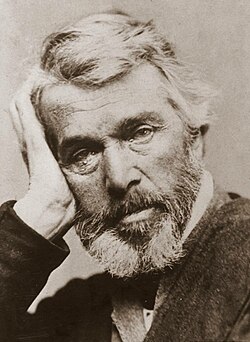Thomas Carlyle Quote
Related Quotes
To begin to know ourselves we must have sincere conversations with ourselves as if with a good friend. We must answer without reserve, listen without judgement, and accept without condition. That is s...
Kamand Kojouri
Tags:
accept, acceptance, answer, ask, begin, better, betterment, compassion, compassionate, condition
I used to be lost in us. Blurred were the lines that separated us. But now, I see our togetherness in our separateness. I see the you in me and the me in you. We are two independent beings who complem...
Kamand Kojouri
Tags:
all you need is love, altogether, beautiful, beauty, beloved, better, blurred, blurry, boyfriend, complement
About Thomas Carlyle
Thomas Carlyle (4 December 1795 – 5 February 1881) was a Scottish essayist, historian and philosopher. Known as the "sage of Chelsea", his writings strongly influenced the intellectual and artistic culture of the Victorian era.
Carlyle was born in Ecclefechan, a village in Dumfriesshire, Scotland. He attended the University of Edinburgh, where he excelled in mathematics and invented the Carlyle circle. After finishing the arts course he prepared to become a minister in the Burgher Church while working as a schoolmaster. He quit these and several other endeavours before settling on literature, writing for the Edinburgh Encyclopædia and working as a translator. He initially gained prominence in English-language literary circles for his extensive writing on German Romantic literature and philosophy. These themes were explored in his first major work, a semi-autobiographical philosophical novel entitled Sartor Resartus (1833–34).
Carlyle eventually relocated to London, where he published The French Revolution: A History (1837). Its popular success made him a celebrity, prompting the collection and reissue of his earlier essays under the title of Miscellanies. His subsequent works were highly regarded throughout Europe and North America, including On Heroes (1841), Past and Present (1843), Cromwell's Letters (1845), Latter-Day Pamphlets (1850), and Frederick the Great (1858–65). He founded the London Library, helped to establish the National Portrait Galleries in London and in Edinburgh, became Lord Rector of the University of Edinburgh in 1865 and received the Pour le Mérite in 1874, amongst other honours.
Carlyle occupied a central position in Victorian culture, being considered the "undoubted head of English letters" and a "secular prophet". Posthumously, a series of publications by his friend James Anthony Froude damaged Carlyle's reputation, provoking controversy about his personal life and his marriage to Jane Welsh Carlyle in particular. His reputation further declined in the aftermaths of the First World War and the Second World War, when his philosophy was seen as a precursor of both Prussianism and fascism. Growing scholarship in the field of Carlyle studies since the 1950s has improved his standing, and although little-read today, he is yet recognised as "one of the enduring monuments of [English] literature".
Carlyle was born in Ecclefechan, a village in Dumfriesshire, Scotland. He attended the University of Edinburgh, where he excelled in mathematics and invented the Carlyle circle. After finishing the arts course he prepared to become a minister in the Burgher Church while working as a schoolmaster. He quit these and several other endeavours before settling on literature, writing for the Edinburgh Encyclopædia and working as a translator. He initially gained prominence in English-language literary circles for his extensive writing on German Romantic literature and philosophy. These themes were explored in his first major work, a semi-autobiographical philosophical novel entitled Sartor Resartus (1833–34).
Carlyle eventually relocated to London, where he published The French Revolution: A History (1837). Its popular success made him a celebrity, prompting the collection and reissue of his earlier essays under the title of Miscellanies. His subsequent works were highly regarded throughout Europe and North America, including On Heroes (1841), Past and Present (1843), Cromwell's Letters (1845), Latter-Day Pamphlets (1850), and Frederick the Great (1858–65). He founded the London Library, helped to establish the National Portrait Galleries in London and in Edinburgh, became Lord Rector of the University of Edinburgh in 1865 and received the Pour le Mérite in 1874, amongst other honours.
Carlyle occupied a central position in Victorian culture, being considered the "undoubted head of English letters" and a "secular prophet". Posthumously, a series of publications by his friend James Anthony Froude damaged Carlyle's reputation, provoking controversy about his personal life and his marriage to Jane Welsh Carlyle in particular. His reputation further declined in the aftermaths of the First World War and the Second World War, when his philosophy was seen as a precursor of both Prussianism and fascism. Growing scholarship in the field of Carlyle studies since the 1950s has improved his standing, and although little-read today, he is yet recognised as "one of the enduring monuments of [English] literature".
